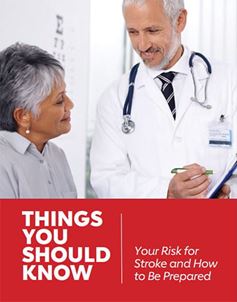Ischemic Stroke (Clots)
What is an Ischemic Stroke?
An ischemic stroke occurs when a vessel supplying blood to the brain is obstructed. It accounts for about 87% of all strokes.

The main cause of ischemic stroke is atherosclerosis, or fatty deposits (plaque) that line the vessel walls. Fatty deposits can cause two types of obstruction:
- Cerebral thrombosis is a thrombus (blood clot) that develops at the site of fatty plaque within a blood vessel that supplies blood to the brain.
- Cerebral embolism is a blood clot that forms in the heart or large arteries of the upper chest or neck, or at another location in the circulatory system. Part of the blood clot breaks loose, enters the bloodstream and travels through the brain’s blood vessels until it reaches vessels too small to let it pass. A main cause of embolism is an irregular heartbeat called atrial fibrillation. It can cause clots to form in the heart, dislodge and travel to the brain.
New Guidance. Broader Impact.
Updated guideline for ischemic stroke addresses major treatment advances, expands adult care and establishes pediatric stroke recommendations for the first time.
Ischemic Stroke Treatment
Medical Therapies
Alteplase (also known as tissue plasminogen activator) and tenecteplase (also known as TNK) are FDA-approved drug treatments for ischemic strokes. Alteplase and tenecteplase work by dissolving the clot and improving blood flow to the part of the brain being deprived of blood flow. If administered within 4.5 hours alteplase or tenecteplase may improve the changes of recovering from a stroke.
Many people don’t arrive at the hospital in time to receive the medication, which can save lives and reduce long-term effects of stroke. So it’s important to identify stroke and seek treatment immediately.
Mechanical Treatment to Remove the Clot
A mechanical thrombectomy removes a clot in eligible patients with a large vessel occlusion, or LVO. In this procedure, doctors use a wire-cage device called a stent retriever. They thread a catheter through an artery in the groin up to the blocked artery in the brain. The stent opens and grabs the clot. Special suction tubes may also remove the clot.
The procedure:
- Is usually done within six hours of the onset of acute stroke symptoms but can be done up to 24 hours after symptoms begin if imaging tests show undamaged brain tissue.
- May include Alteplase IV r-tPA treatment in eligible patients.
Additional Stroke Treatments
Individualized hospital care for stroke focuses on many aspects of recovery, including:
- Monitoring and observing to detect and prevent complications
- Finding the cause of the stroke
- Identifying and initiating treatment to prevent further strokes
- Starting the recovery process, including determining rehabilitation needs
- Providing instruction and guidance for next steps, including a follow-up plan to prevent another stroke
Additional resources for acute ischemic stroke and treatment
Silent Stroke
Other conditions related to SCI:
Atrial fibrillation (AFib) is the most common significant irregular heartbeat. It increases the risk of SCI more than three-fold. As we age, our risk for both atrial fibrillation and SCI increases.
Risk factors for silent stroke are also risk factors for AFib.
High systolic blood pressure (the top number in a measurement) is a risk factors for SCI. Diagnosing and preventing hypertension early are important steps to reduce silent stroke risk.
Silent strokes can decrease cognition (mental functions including memory, thinking, judgment and the ability to learn).




